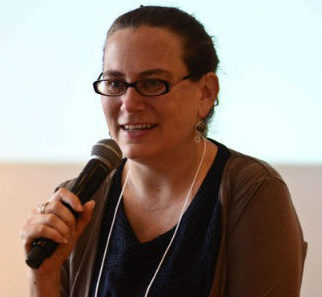“I knew something like this was coming,” said the octogenarian with wizened face and farmer’s posture. “I’ve been a township trustee for over 40 years. It used to be that new drilling sites had to be approved by the township. Just a few years ago, the state took our power away. Now they alone can regulate drilling decisions. There is nothing we can do to stop this.”
At this point, my heart dropped. This was a handful of years ago at a local meeting about fracking in my county seat. I’d seen the movie Gasland and was concerned about how fracking might impact my own region. Since that time, a multitude of injection wells have been filled in my Ohio county, each one a threat to our water supply. Of all the potentially disturbing facts and figures about fracking, the most disturbing to me was the way that decision-making about such an important and delicate issue had been removed from my locally elected officials.
Three weeks ago, we read G!d’s instruction to ‘make Me a sanctuary and I will dwell among them.’ This week the mishkan, or tabernacle, will be constructed without a hitch. However, before the mishkan was crafted, we can imagine a fair amount of anxiety among the Israelites. If the mishkan were not built correctly, G!d would not dwell among the people. This important and delicate task must be entrusted to the right person.
See, G!d called by name Betzalel, son of Hur, of the tribe of Judah. He filled him with a divine spirit, with wisdom, with insight and with knowledge. (Exodus 35:30-31)
In the Babylonian Talmud (Berachot 55a), Rav points out that wisdom, insight and knowledge are the same qualities through which G!d founded the earth (wisdom), created the heavens (insight) and uprooted primordial chaos (knowledge) in Proverbs 3:19-20. Commenting on this Talmudic perspective, Rav Kook points out that “the master craftsman [Betzalel] was privy to the very secrets of creation.”
Any complex system – like every natural and social system — is made up of parts that interact with each other. A leader who thinks with a systems-mindset will always try to understand the relationships among those parts, the relationships between the parts and the whole system, and what emerges beyond the parts. This awareness of the very building blocks of reality, a truly systems-perspective, is one way to imagine why and how Betzalel would be the right kind of leader for this project. To steward a process as precious as creating the human-divine meeting place, a leader must understand the essential systems by which life and world are created.
On the same page of Talmud however, another sage sees this story not as a divine decree, but as an inclusive process. Rabbi Itzchak Naphkha reads Exodus 35:30 as Moses going to the people for approval of G!d’s choice. As he reads the story,
G!d says to Moses – Moses, is he suitable for you? He said, ‘Master of the Universe, if he is suitable for you, then all the more so for me!’ [G!d said] ‘nevertheless, go and tell [Israel, and ask their opinion.’] He went and said to Israel, ‘Is Betzalel suitable for you?’ They said to him, ‘If he is suitable for the Holy One Blessed be He and for you, then all the more so for us!’
When Moses gives the Israelites veto power, they do not choose to exercise it. Still, Rabbi Itzchak deduces that ‘One may only appoint a leader over the community if they consult with the community.’ The people are not passive recipients of choices made for them. In Rabbi Itzchak’s version, Betzalel is only made leader because the people affirm him.
To steward a process as precious as water safety, a leader must understand the essential systems by which life and world are created — or at least approach that by employing a systems perspective. AND have the vote of confidence of the people whose water is at stake — whether in Ohio, Flint or elsewhere. We can only hope that those who determine water safety will be guided by wisdom that accounts for future generations’ needs, insight fueled by the precautionary principle, and knowledge of the best ways to balance public health with economic stability.
Rabbi Lee Moore is Director of Jewish and Organizational Learning for Lippman Kanfer Foundation for Living Torah and serves Hillel at Kent State in her hometown of Kent, Ohio.
Want to receive Torah from T’ruah in your inbox every week? Sign up here!

